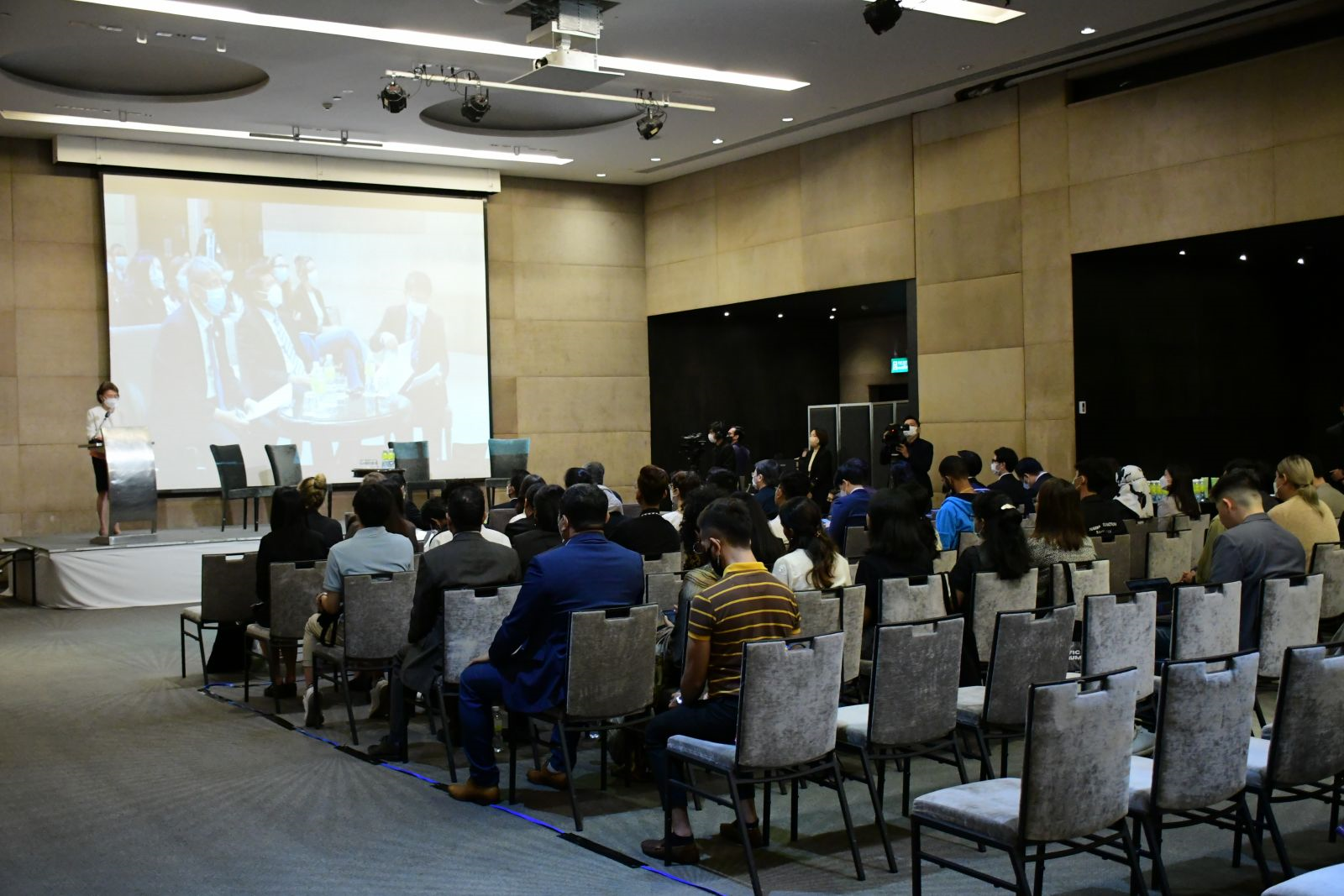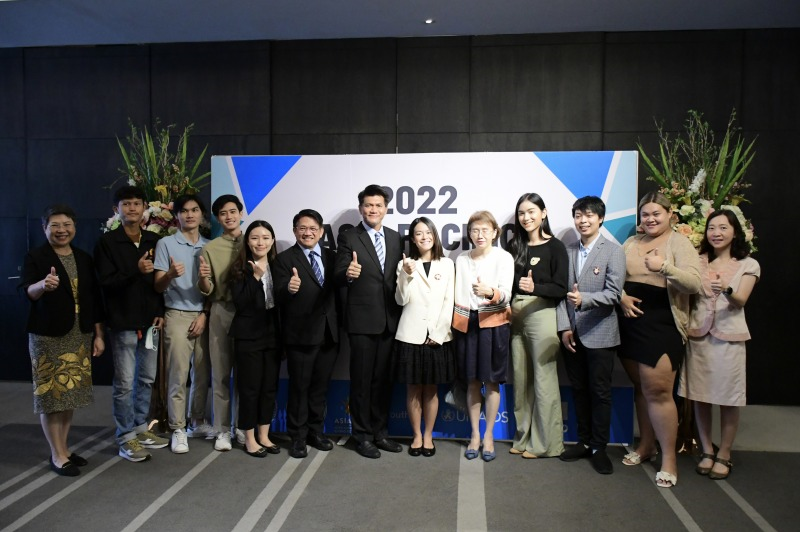อธิบดีกรมองค์การระหว่างประเทศ เข้าร่วมกิจกรรม Asia-Pacific Youth Forum ประจำปี ๒๕๖๕ ในหัวข้อ “Putting Young Key Populations first to end AIDS by 2030”
อธิบดีกรมองค์การระหว่างประเทศ เข้าร่วมกิจกรรม Asia-Pacific Youth Forum ประจำปี ๒๕๖๕ ในหัวข้อ “Putting Young Key Populations first to end AIDS by 2030”
เมื่อวันที่ ๒๑ ตุลาคม ๒๕๖๕ นางเอกสิริ ปิณฑะรุจิ อธิบดีกรมองค์การระหว่างประเทศ พร้อมด้วยนายสาธิต ปิตุเตชะ รัฐมนตรีช่วยว่าการกระทรวงสาธารณสุข และนายโทฟิก บักคาลิ รักษาการผู้อำนวยการโครงการโรคเอดส์ แห่งสหประชาชาติ (UNAIDS) ประจำภูมิภาคเอเชียและแปซิฟิก กล่าวเปิดการประชุมระดับสูงของกิจกรรม “2022 Asia-Pacific Youth Forum: Putting Young Key Populations first to end AIDS by 2030” ณ โรงแรมฮอลิเดย์ อินน์ สุขุมวิท โดยมี นพ.ปรีชา เปรมปรี รองอธิบดีกรมควบคุมโรค ผู้แทนหน่วยงานภาครัฐ ผู้แทนเยาวชน และผู้แทนภาครัฐจากภูมิภาคเอเชียและแปซิฟิก ๒๒ ประเทศ ได้แก่ ไทย บังกลาเทศ บรูไนฯ กัมพูชา จีน ฟิจิ อินเดีย อินโดนีเซีย อิหร่าน ญี่ปุ่น ลาว มาเลเซีย มองโกเลีย เมียนมาร์ เนปาล ปากีสถาน ปาปัวนิวกีนี ฟิลิปปินส์ สิงค์โปร์ ศรีลังกา ติมอร์-เลสเต และเวียดนาม เข้าร่วมประชุมทั้งแบบ on-site และ online รวม ๗๕ คน

วัตถุประสงค์ของกิจกรรมฯ ได้แก่ (๑)ย้ำความมุ่งมั่นเรื่องการมีส่วนร่วมของทุกภาคส่วนในการสนับสนุนกลุ่มประชากรหลักที่มีอายุน้อย (Young Key Populations - YKP) (๒) สร้างพื้นที่สำหรับการสนทนา การแบ่งปันบทเรียน แนวปฏิบัติที่ดี และนวัตกรรมที่ช่วยสนับสนุนโครงการที่เกี่ยวกับ YKP อาทิ กลุ่มเยาวชน รัฐบาล พันธมิตรด้านการพัฒนา และผู้มีส่วนได้ส่วนเสียอื่น ๆ ในภูมิภาคเอเชียแปซิฟิก และ (๓) ส่งเสริมความร่วมมือและความเป็นหุ้นส่วนระหว่างผู้เล่นหลักข้างต้น เพื่อสร้างความเข้มแข็งให้กับการตอบสนองต่อเอชไอวี/เอดส์สำหรับ YKP รวมทั้งในช่วงการแพร่ระบาดของโรคเอดส์ และ COVID-19
อธิบดีเอกสิริฯ ยังได้ร่วมแลกเปลี่ยนบทเรียนสำคัญของไทยในช่วง ๒-๓ ปีที่ผ่านมา เกี่ยวกับการส่งเสริมสุขภาพสำหรับทุกคน โดยเฉพาะสำหรับกลุ่ม YKP ดังนี้
(๑) ส่งเสริมให้ “ความเท่าเทียมด้านสุขภาพ” เป็นรากฐานของระบบสุขภาพ เพื่อไม่ทิ้งใครไว้ข้างหลัง โดยเฉพาะกลุ่ม YKP โดยใช้ประโยชน์สูงสุดจากหลักประกันสุขภาพถ้วนหน้า (UHC) ทั้งนี้ เพื่อช่วยให้บริการด้านสุขภาพมีความต่อเนื่อง และประชาชนเข้าถึงบริการและยารักษาเอชไอวี/เอดส์ อย่างเท่าเทียม (๒) ส่งเสริม "พื้นที่ปลอดภัย ดีต่อสุขภาพ และเอื้ออำนวย" ในสังคม
ที่ออกแบบโดยกลุ่ม YKP เพื่อกลุ่ม YKP พร้อมส่งเสริมให้เยาวชนเป็นผู้นำการเปลี่ยนแปลงอย่างแท้จริง และให้การสนับสนุนซึ่งกันและกันในกลุ่ม YKP (๓) ส่งเสริมให้เยาวชนมีส่วนร่วมในการเผยแพร่ความรู้ด้านสุขภาพ และเข้าถึงบริการด้านคำปรึกษาและข้อมูลที่จำเป็น
นอกจากนี้ ผู้แทนเยาวชนได้ร่วมกันนำเสนอประเด็นสำคัญที่ทุกภาคส่วนควรเร่งดำเนินการในลำดับแรก อาทิ เสริมสร้างการมีส่วนร่วมและความเป็นผู้นำของเยาวชนในการตอบสนองต่อเอชไอวี สื่อสาร/รณรงค์/ให้ความรู้ เกี่ยวกับโครงการและข้อริเริ่มด้านเอชไอวี สิทธิทางเพศและอนามัยเจริญพันธุ์สำหรับเยาวชน ส่งเสริมการเข้าถึงบริการเอชไอวีอย่างเท่าเทียมและสะดวก รวมทั้งในพื้นที่ชนบท ปรับปรุงบริการฯ ให้ทันสมัยและเหมาะสมต่อความต้องการเฉพาะของกลุ่มเป้าหมาย ปฏิรูปแนวคิด/ความเชื่อ เพื่อขจัดปัญหาการตีตราและการเลือกปฏิบัติในครอบครัวและสถานศึกษา ให้ความสำคัญกับการลงทุนเพื่อเสริมสร้างความเข้มแข็งและความยั่งยืนขององค์กรที่นำโดยเยาวชน เป็นต้น
ทั้งนี้ ประเด็นต่าง ๆ ที่ผู้แทนเยาวชนนำเสนอข้างต้นยังสอดคล้องกับคำมั่นโดยผู้นำและผู้แทนระดับสูงของประเทศสมาชิกสหประชาชาติ (รวมทั้งไทย) ที่ปรากฏในปฏิญญาทางการเมืองว่าด้วยเอชไอวีและเอดส์ ค.ศ. ๒๐๒๑ อีกทั้งสอดรับกับเอกสาร Global AIDS Strategy 2021–2026 อีกด้วย.

*****
Director-General of the Department of International Organizations attended the 2022 Asia-Pacific Youth Forum: Putting Young Key Populations first to end AIDS by 2030
On 21 October 2022, Mrs. Eksiri Pintaruchi, Director-General of the Department of International Organizations, Ministry of Foreign Affairs together with Mr. Satit Pitutacha, Deputy Minister of Public Health, and Mr. Tofik Bagkali, Acting Director of UNAIDS for Asia and the Pacific, gave welcoming remarks at the High-level session of the “2022 Asia-Pacific Youth Forum: Putting Young Key Populations first to end AIDS by 2030”, at Holiday Inn Bangkok Sukhumvit.
The event was attended by government agency representatives, youth representatives and government representatives from 22 countries in the Asia-Pacific region: Thailand (led by Dr. Preecha Prempri, Deputy Director-General of the Department of Disease Control), Bangladesh, Brunei Darussalam, Cambodia, China, Fiji, India, Indonesia, Iran, Japan, Lao PDR, Malaysia, Mongolia, Myanmar, Nepal, Pakistan, Papua New Guinea, Philippines, Singapore, Sri Lanka, Timor-Leste and Viet Nam, through on-site and online, in total 75 people.
The event has objectives to (1) advocate for multi-stakeholders’ commitments and actions to strengthen young key populations (YKP); (2) create spaces for dialogue, sharing of lessons learned, good practices and innovative interventions on YKP programmes among key players such as youth groups, governments, development partners and other stakeholders in the Asia-Pacific region; and (3) foster collaboration and partnerships among the aforementioned key players in strengthening the HIV/AIDS response for YKP, including in the midst of AIDS epidemic and COVID-19 pandemic.
On this occasion, Director-General shared Thailand’s following key lessons learned during the past few years on the promotion of health for all, especially that of young YKP:
(1) Place “Health equity” at the center of health systems to ensure that no one is left behind, especially YKP, by maximizing Universal Health Coverage (UHC) to promote equitable access to health services and medicines for HIV/AIDS; (2) Promote ‘safe, healthy and enabling spaces’ designed by YKP and for YKP, while empowering them to be real agents of change and provide peer-to-peer support; (3) Continue to engage YKP in promoting health literacy, providing them with access to counselling services and necessary information.
In addition, the youth delegates jointly presented key issues that all sectors should urgently address,
such as (1) strengthen youth participation and leadership in HIV/AIDS response (2) promote campaigns and education on HIV programs and initiatives; (3) ensure sexual and reproductive rights for young people; (4) promote equitable and facilitated access to HIV services, including in rural areas; (5) improve the quality of health services and cater them to specific needs of the target group; (6) transform beliefs to ensure reduction of stigma and discrimination in families and school settings; (7) promote investment to ensure strengthening and sustainability of youth-led organizations.
Many of the aforementioned points raised by youth delegates are also in line with the commitments made by leaders and high-level representatives of the UN member states, including Thailand, in the 2021 Political Declaration on HIV and AIDS and the 2021-2026 Global AIDS Strategy.
*****
Tag
Department of International Organizations
วันทำการ : จันทร์ - ศุกร์ เวลา 08.30 - 16.30 น.
(ยกเว้นวันหยุดนักขัตฤกษ์)